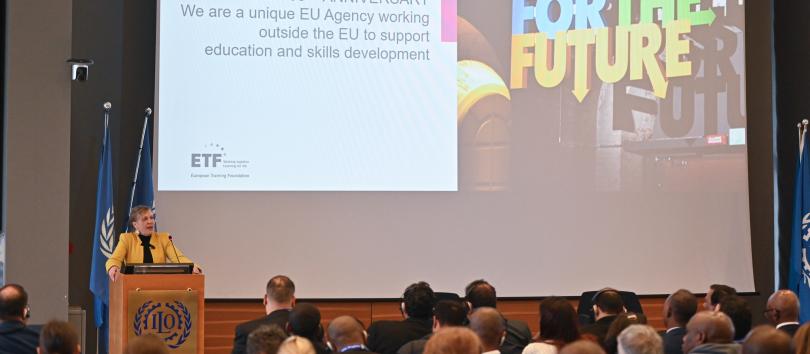
What is needed to build quality apprenticeship programmes?
Insights from the ITCILO Skills Fair in Turin
The Skills Fair on Quality Apprenticeships, organised by the International Training Centre of the International Labour Organisation (ITCILO) with support from the European Training Foundation (ETF), brought together over 1,000 participants from all over the world. This hybrid event which took place on 27, 28 and 29 February 2024 at the ITCILO Campus in Turin (Italy), was designed to promote the adoption of the ILO’s Quality Apprenticeships Recommendation (R208). By convening policymakers, industry experts, and youth representatives from Europe, Africa, Australia and Latin America, the Skills Fair sought to shape policy approaches, foster collaboration, and promote inclusive, rights-based apprenticeship programmes. To learn more: Skills Fair event conclusions.
The opening session featured a welcome from Arturo Faggio, Director of Education, Training and Work of the Piedmont Region, highlighting the campus role in job promotion and international cooperation, emphasising themes of youth, skills, apprenticeship, work, and education unity. The region receives support from the European Union, backing projects aligned with the European Commission's goals, advocating apprenticeships for youth as outlined in the European Framework for Quality and Effective Apprenticeships, and supported by the European Alliance for Apprenticeships (EAfA) for inclusion, mobility, and growth. Likewise, the ILO's Recommendation 208 underscores inclusive policies for public and private entities, urging adoption and resource allocation for effective implementation.
Speaking during the opening session, Pilvi Torsti, ETF Director, highlighted the importance of significant global shifts impacting the workforce, including technological advancements and demographic changes. She emphasised the critical need for the creation of decent jobs and highlighted the key role of quality apprenticeships. She also underscored the collaborative nature of the event, which united international organisations, policymakers and stakeholders to discuss the relevance of apprenticeships in addressing future work challenges, encouraging an active participation and robust discussions among attendees throughout the event.
“Young people are not the future, they are the present,” Torsti said.
Key issues for quality apprenticeships
Throughout the panels discussions, the representatives of various organisations and NGOs shared success stories from Africa, Asia and Australia, displaying the transformative impact of apprenticeships, and emphasising government commitment and innovative training methodologies. They also explored topics such as talent retention, the green transition, and the role of apprenticeships in sustainable development, emphasising multi-stakeholder collaboration and inclusivity.
The discussions focused on protecting apprentices, promoting gender equality, and crafting regulatory frameworks. The recommendations included the regular monitoring of apprentices' progress, dispelling misconceptions, and fostering social dialogue. Implementing robust regulatory frameworks, adapting recommendations to local contexts, financing programmes and training of qualified personnel to support apprentices were identified as key factors in ensuring the success of apprenticeship programmes.
Furthermore, social dialogue was identified as one of the key aspects – at the core of designing, implementing, and governing well-functioning apprenticeship systems.
“Many issues related to apprenticeships require consensus building across the constituents of social dialogue, for example the rights of apprentices, cost-sharing modalities between companies and the public sector, and quality,” said Matthias Themel, ETF expert, who led the session on social dialogue.
“Adequate governance arrangements need to be in place, giving clear roles and responsibilities to the various institutions and stakeholders, including tripartite actors,” he added.
Another key challenge addressed in the panels was shifting the perception of companies regarding apprenticeships. This shift can be supported by presenting data to demonstrate that having apprentices is an investment rather than a cost. The discussion emphasised the long-term benefits, highlighting how apprentices can reduce expenses and evolve into valuable assets for businesses rather than being unskilled labour or undervalued resources. Contrarily, the notion of apprentices as inexpensive substitutes for highly skilled professionals needs to be discouraged.
Equity, diversity, and inclusion within apprenticeship programmes and the role of intermediaries in expanding apprenticeships were highlighted, as well as strategies for addressing challenges such as youth unemployment and skills gaps.
In concluding the event, the final speakers stressed the importance of apprenticeships as building blocks for sustainability and economic prosperity, and the fact that every country should adopt the ILO’s Quality Apprenticeships Recommendation (R208), no matter how developed, but customised in line with their specific needs and resources.
Good practice in the Piedmont Region
A success story of apprenticeships in the Piedmont Region, which featured at the event, is the Istituto Tecnico Superiore (ITS) Aerospace Piemonte which is a higher secondary level vocational institute. With a post-programme 98% employment rate, the ITS provides courses in mechatronics, automotive, aerospace, and production process management. Through hands-on training, students acquire skills relevant to these fields. They also collaborate with companies to develop curricula aligned with industry needs, fostering a cooperative environment for apprentices' growth and progress.
Did you like this article? If you would like to be notified when new content like this is published, subscribe to receive our email alerts.